| Srl | Item |
| 1 |
ID:
086440
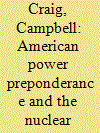

|
|
|
|
|
| Publication |
2009.
|
| Summary/Abstract |
The theory of Power Preponderance put forward by Stephen Brooks and William Wohlforth is poised to replace structural balance-of-power theory as the leading American Realist interpretation of international politics. Power Preponderance argues that would-be rivals to the US are not balancing against it because they are dissuaded from doing so by geopolitical and structural factors, rather than because they love the US or are cowed by it. This article shows why the central analytical claim of Power Preponderance would be substantially enhanced by incorporating the logic of the nuclear revolution, but that its main policy recommendation - indefinite and magnanimous American preponderance - is undermined by the spectre of nuclear war. In the nuclear age, normative solutions to the problem of anarchy invariably gravitate toward the logic of a world state.
|
|
|
|
|
|
|
|
|
|
|
|
|
|
|
|
| 2 |
ID:
084145
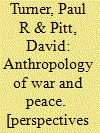

|
|
|
|
|
| Publication |
Massachusetts, Bergin and Garvey Publishers, 1989.
|
| Description |
xvi, 208p.
|
|
|
|
|
|
|
|
|
|
|
|
Copies: C:1/I:0,R:0,Q:0
Circulation
| Accession# | Call# | Current Location | Status | Policy | Location |
| 031260 | 303.66/TUR 031260 | Main | On Shelf | General | |
|
|
|
|
| 3 |
ID:
158605
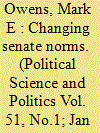

|
|
|
| 4 |
ID:
100957


|
|
|
|
|
| Publication |
2010.
|
| Summary/Abstract |
The Cold Start doctrine is an innovative exercise. While Cold Start discusses how to start the campaign, equal thinking needs to attend how to end it. On the conventional level, the learning is that the Cold Start offensives of the integrated battle groups need to be delinked from those of the strike corps. Plausible political aims cannot be visualised that make nuclear risk of launch of strike corps offensives worth running. On the nuclear front, fallout of the scenario considered is on the doctrine of 'massive' nuclear retaliation. This has its limitations in reacting to nuclear strikes of low opprobrium quotient. Moving to 'flexible' nuclear retaliation countenancing ending an exchange at the lowest possible level may be preferable instead. In the nuclear age, utility of military force has reached its limits. The future lies in energising non-military problem solving approaches.
|
|
|
|
|
|
|
|
|
|
|
|
|
|
|
|
| 5 |
ID:
185302
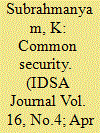

|
|
|
| 6 |
ID:
132586
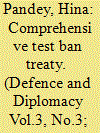

|
|
|
|
|
| Publication |
2014.
|
| Summary/Abstract |
Mushroom Clouds
Nuclear Age
Emerging Power
Atomic Bomb
Lethal Capabilities
Atomic Explosion
Nuclear Realm
Catastrophic Eventualities
Nuclear Hazards
Security Balance
Comprehensive Test Ban Treaty - CTBT
Nuclear Regime
American Perspective
Strategic Policy
|
|
|
|
|
|
|
|
|
|
|
|
|
|
|
|
| 7 |
ID:
092366
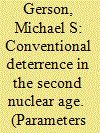

|
|
|
| 8 |
ID:
117997
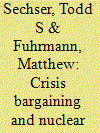

|
|
|
|
|
| Publication |
2013.
|
| Summary/Abstract |
Do nuclear weapons offer coercive advantages in international crisis bargaining? Almost seventy years into the nuclear age, we still lack a complete answer to this question. While scholars have devoted significant attention to questions about nuclear deterrence, we know comparatively little about whether nuclear weapons can help compel states to change their behavior. This study argues that, despite their extraordinary power, nuclear weapons are uniquely poor instruments of compellence. Compellent threats are more likely to be effective under two conditions: first, if a challenger can credibly threaten to seize the item in dispute; and second, if enacting the threat would entail few costs to the challenger. Nuclear weapons, however, meet neither of these conditions. They are neither useful tools of conquest nor low-cost tools of punishment. Using a new dataset of more than 200 militarized compellent threats from 1918 to 2001, we find strong support for our theory: compellent threats from nuclear states are no more likely to succeed, even after accounting for possible selection effects in the data. While nuclear weapons may carry coercive weight as instruments of deterrence, it appears that these effects do not extend to compellence.
|
|
|
|
|
|
|
|
|
|
|
|
|
|
|
|
| 9 |
ID:
132877
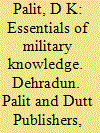

|
|
|
|
|
| Publication |
Dehradun, Palit and Dutt Publishers, 1970.
|
| Description |
230p.Hbk
|
| Contents |
B
|
|
|
|
|
|
|
|
|
|
|
|
Copies: C:1/I:0,R:0,Q:0
Circulation
| Accession# | Call# | Current Location | Status | Policy | Location |
| 057858 | 355/PAL 057858 | Main | On Shelf | General | |
|
|
|
|
| 10 |
ID:
047079
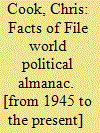

|
|
|
|
|
| Edition |
4th ed.
|
| Publication |
New York, Facts on file, 2001.
|
| Description |
vii, 600p.
|
| Standard Number |
0816042950
|
|
|
|
|
|
|
|
|
|
|
|
Copies: C:1/I:0,R:0,Q:0
Circulation
| Accession# | Call# | Current Location | Status | Policy | Location |
| 044407 | 320.03/COO 044407 | Main | On Shelf | General | |
|
|
|
|
| 11 |
ID:
130375
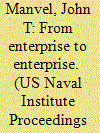

|
|
|
| 12 |
ID:
128538
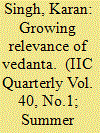

|
|
|
| 13 |
ID:
138014
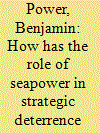

|
|
|
| 14 |
ID:
049745
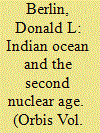

|
|
|
| 15 |
ID:
131418
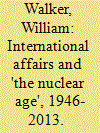

|
|
|
|
|
| Publication |
2014.
|
| Summary/Abstract |
The article reflects on the distinguished record of publication, in around 130 articles over nearly seventy years, on nuclear politics in International Affairs. Although constituting a small drop in the torrent of writings on nuclear matters since 1945, it can fairly be regarded as the most significant contribution to nuclear discourse by any journal outside the United States. The articles published in International Affairs have covered a wide range of issues including nuclear deterrence and strategy, arms control, non-proliferation and disarmament, and the policies-and drivers of policy-of countries, in particular the UK and US. Authors have included P. M. S. Blackett, Wyn Bowen, Alastair Buchan, Hedley Bull, Pierre Hassner, Michael Howard, Rebecca Johnson, Michael MccGwire, Michael Quinlan, Nick Ritchie, John Simpson and David Yost. The discussion concludes with Ian Smart's article of 1975 in which he contemplates the nature of the 'nuclear age' and its persistence or passing, and comments on governments' 'fatuous' attachment of prestige value to nuclear weapons.
|
|
|
|
|
|
|
|
|
|
|
|
|
|
|
|
| 16 |
ID:
064746
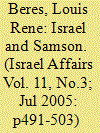

|
|
|
| 17 |
ID:
166132
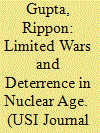

|
|
|
|
|
| Summary/Abstract |
Deterrence meant different things to different people at different times. Disagreement on the meaning of deterrence led to divergent interpretations. However, since the challenge which deterrence seeks to answer is capable of assuming different forms, the concept of deterrence too has unavoidably assumed different roles. Defined in simple words, deterrence means providing unmistakable evidence of retaliatory capacity to the enemy with a view to deterring him from initiating any military move for gains. It operates as the “skillful non-use of military forces”. General Beaufre said:
“The object of deterrence is to prevent an enemy power taking the decision when faced with a given situation to act or react in the light of the existence of a set of dispositions which constitute an effective threat. The result, which it is desired to achieve, is therefore a psychological one and it is sought by means of a threat.”
|
|
|
|
|
|
|
|
|
|
|
|
|
|
|
|
| 18 |
ID:
105349
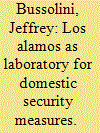

|
|
|
|
|
| Publication |
2011.
|
| Summary/Abstract |
Much of the strategic analysis, geographic knowledge/ignorance, and military-security emphasis of post-September 11th America bore a striking resemblance to Los Alamos of the 1980s. After briefly considering the foreign-policy aspects of the work at Los Alamos and some theoretical, historical, and state aspects of the nuclear age that define the domestic space and the population as targets, I focus on the many ways in which the Laboratory has served as a site of development for domestic security measures. In some cases it is the community of Los Alamos at large which seems to be the template for the measures, inasmuch as this is a town adjoining and surrounding the Laboratory. One of the main thrusts of the argument here is that the division between 'foreign' and 'domestic' in contemporary intelligence and military strategy is specious.
|
|
|
|
|
|
|
|
|
|
|
|
|
|
|
|
| 19 |
ID:
170551


|
|
|
|
|
| Publication |
New Delhi, Observer Research Foundation, 2019.
|
| Description |
157p.pbk
|
| Standard Number |
9789388262675
|
|
|
|
|
|
|
|
|
|
|
|
Copies: C:1/I:0,R:0,Q:0
Circulation
| Accession# | Call# | Current Location | Status | Policy | Location |
| 059835 | 327.1747/SOO 059835 | Main | On Shelf | General | |
|
|
|
|
| 20 |
ID:
059826
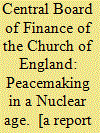

|
|
|
|
|
| Publication |
London, Church house Publishing, 1988.
|
| Description |
viii, 176p.
|
| Standard Number |
0715165739
|
|
|
|
|
|
|
|
|
|
|
|
Copies: C:1/I:0,R:0,Q:0
Circulation
| Accession# | Call# | Current Location | Status | Policy | Location |
| 043254 | 327.172/CEN 043254 | Main | On Shelf | General | |
|
|
|
|